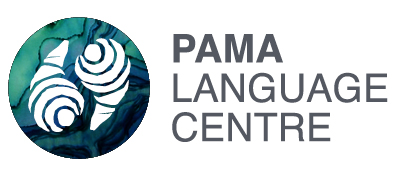Guugu Yimithirr Lesson 3
Making whole sentences
In this lesson we’ll learn some everyday words, and animal words, such as gudaa – “dog”.
gudaa – dog
Watch, listen and practice this yourself.
We’ll learn some words so that you can start talking guugu with your children today.
Whole sentences with yiyi
We want to remember to always speak in whole sentences. With the word yiyi (“this”) we can do that.
Remember
Try to always speak in whole sentences.
yiyi – this
Watch, listen and practice this yourself.
We recall that Guugu Yimithirr doesn’t use words for “am”, “are” and “is”. If we say Yiyi gudaa, we have said a whole sentence.
Let’s make a three-word sentence now. We can use another word we have learned: ngathu – “my”.
ngathu – my
From lesson 2
ng – like in “sing”
From lesson 1
th – tongue between teeth
Watch, listen and practice this yourself.
Putting the words together, we can say a three-word sentence:
Yiyi ngathu gudaa – “This is my dog”
If we also learn the word for “your”, we can have a longer conversation. The word for “your”, if we’re talking to one person, is nhanu.
nhanu – your (one person)
From lesson 1
nh – tongue between the teeth
Watch, listen and practice this yourself.
Some words to make sentences
Here are some everyday words for our vocabulary. Children and adults will be able to make lots of sentences with these.
jijirr – bird
Watch, listen and practice this yourself.
buthigan – cat
A bit more
In this video Lillian pronounces buthigan a bit like bujigan. The sounds TH and J are very close in Guugu Yimithirr.
The word buthigan comes from “pussycat”. The English sound S becomes TH in Guugu Yimithirr, and no Guugu Yimithirr word can end in T or D, so the last sound is changed to N.
gaban – book
Origin of this word
Before there were books, the meaning of gaban was “mark” or “cut”.
Watch, listen and practice this yourself.
nambal – money or stone
Origin of this word
Before there was money, the meaning of nambal was “stone”.
Watch, listen and practice this yourself.
Practice saying whole sentences
Use the words yiyi (“this”) ngathu (“my”) nhanu (“your”) and construct sentences together with the people around you.
You can put and English word in a sentence, like Yiyi ngathu computer. It doesn’t matter; Guugu Yimithirr speakers do it all the time. The main thing is that you get going saying sentences and move the personal pronouns ngathu and nhanu to your long-term memory.
SUMMARY OF LESSON 3
We can say a large number of complete sentences meaning “This (is) my…” and “This (is) your…”
WORDS IN LESSON 3
yiyi – “this”
ngathu – “my”
nhanu – “your” (one person)
jijirr – “bird”
buthigan – “cat”
gaban – “book”
nambal – “money”
GRAMMAR FACTS IN LESSON 3
Usually is no words for “is”, so we say Yiyi gaban (“This book”).
TEST YOURSELF
Now go to the Quizlet web site to practice these words:
https://quizlet.com/304737400/guugu-yimithirr-lesson-3-flash-cards/
Now practice making some Guugu Yimithirr sentences with your family.
